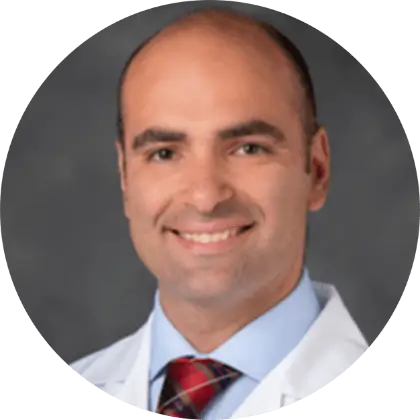
Dr. Tiberio M Frisoli
Address: 1 Ford Pace, Detroit, Michigan, 48202, United States, Wayne State University
Gender: Male
About the Doctor / Professional
I am trained in, and regularly perform, minimally-invasive heart operations heart valve repairs or replacements (TAVR, mitraclip, etc.), structural heart interventions and vascular peripheral interventions. I also perform and interpret ultrasounds of your heart to better manage conditions such as heart failure and arrhythmias. I am proud to have completed all of my training at Henry Ford and have chosen to stay so that I may better help the people of Michigan through collaboration with my mentors and peers.
Care Philosophy:
First, I want you, the patient, to be educated about the state of your disease, as well as which healthcare options are available to you. Together, we will consider the risks and benefits of our decision to perform, or not perform, any cardiac intervention. I will always take the time to answer any questions and candidly provide any necessary information prior to performing any procedure. When I perform an intervention, I do so with confidence and conviction with a humble sense of when to stop. By doing so, I am able to abide by the physician’s principal creed of “First, to do no harm.”
Research Interests:
Dr. Frisoli has an interest in the research of minimally-invasive heart valve operations, hypertrophic cardiomyopathy, evaluation of chest pain in the emergency department, and paravalvular leak repairs.
Degree: St. George's University School of Medicine New York 2009
Residency: St. Luke's Roosevelt Hospital Center, Internal Medicine, New York
- Dr. Tiberio Frisoli is a specialist in Cardiology and Interventional Cardiology.
- He is trained in, and regularly performs, minimally-invasive heart operations heart valve repairs or replacements (TAVR, mitraclip, etc.), structural heart interventions, and vascular peripheral interventions.
- He also performs and interprets ultrasounds of your heart to better manage conditions such as heart failure and arrhythmias.
- First Place for Fellow Clinical Research category - Feb. 2016
- American College of Cardiology's Annual Michigan state conference, First Place - Oct. 2015
- CVRI Young Investigator Award - Sept. 2015
- Fellow-in-Training Oral Case Competition, First Place - Sept. 2013
- Chief Cardiology Fellow 2014-2015, Structural Heart Disease Fellowship Best Research Award 2017
- Interventional Cardiology Fellowship Best Research Award 2016
- Cardiovascular Disease Fellowship Best Research Award 2015
- Transseptal puncture through an Amplatzer Atrial Septal Occluder for edge-to-edge repair with MitraClip NTr system.
- Increased Risk of Perioperative Ischemic Stroke in Patients Who Undergo Noncardiac Surgery with Preexisting Atrial Septal Defect or Patent Foramen Ovale.
- The "Snare-and-Anchor" Technique to Rescue Frozen Mechanical Mitral Valve Leaflet After Transcatheter Aortic Valve Replacement.
- Complete percutaneous apical access and closure: Short and intermediate term outcomes.
- Using the Arm for Structural Interventions: Case Selection or Wave of the Future.
- Transcaval Access for Large Bore Devices.
- Percutaneous Approaches to the Treatment of Mitral Leaflet Perforation and to Residual Regurgitation After Transcatheter Edge-to-Edge Mitral Valve Repair.
- Lithotripsy-Facilitated Mitral Balloon Valvuloplasty for Senile Degenerative Mitral Valve Stenosis.
- Snatching Defeat From the Jaws of Victory-Bioprosthetic Valve Dysfunction After Percutaneous Mitral Paravalvular Leak Closure: Salvage by Transcatheter Mitral Valve-in-Valve.
- Comparison of Outcomes of Transcatheter Versus Surgical Aortic Valve Replacement in Patients ≥80 Years of Age.
- Percutaneous Repair of Mitral Valve Leaflet Perforation.
- Comparison of Clinical and Echocardiographic Outcomes After Surgical Redo Mitral Valve Replacement and Transcatheter Mitral Valve-in-Valve Therapy.
- Mitral Annuloplasty Ring Fracture and Annular Injury During Transcatheter Mitral Valve-in-Ring Intervention.
- Henry Ford HEART Score Randomized Trial: Rapid Discharge of Patients Evaluated for Possible Myocardial Infarction.
- Respect the Septal Perforator: Septal Artery Perforation During CTO PCI Resulting in Massive Interventricular Septal Hematoma and Biventricular Cardiac Obstructive Shock.
- Cardiac tamponade due to pyopneumopericardium from malignant bronchopericardial fistula.
- Surgical Paravalvular Leak Closure: No More Second Chances.
- Clinical Updates in Women's Health Care Summary: Structural Heart Disease: Primary and Preventive Care Review.
- Prognostic Utility of a Modified HEART Score in Chest Pain Patients in the Emergency Department.
- Rotational Atherectomy of Three Overlapping Stent Layers.
- Short- and Long-Term Prognostic Utility of the HEART Score in Patients Evaluated in the Emergency Department for Possible Acute Coronary Syndrome.
- Mechanical circulatory support with impella to facilitate percutaneous coronary intervention for post-TAVI bilateral coronary obstruction.
- Wretched excess: stool-softener abuse and cardiogenic shock.
- Salt and hypertension: is salt dietary reduction worth the effort?
- Beyond salt: lifestyle modifications and blood pressure.
- Arrhythmia Surgery
- Cardiology Consultation
- Complex Coronary Interventions
- Heart Failure
- Heart Valve Replacement
- Interventional Cardiology
- Minimally Invasive Surgery
- MitraClip
- Percutaneous Coronary Intervention
- Peripheral Interventions
- Transcatheter Aortic Valve Implantation (TAVI)
- Tricuspid Atresia Treatment
- Heart Ultrasound
